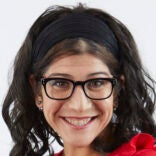The Eruv is a feminist issue. It is a couples’ issue. It is a community issue. I loved Avital Chizhik’s piece about why an Eruv is important for those with children. But I noticed two threads that evolved in response to her piece.
On my social feed, I watched many virtually yet vigorously nodding their heads. If you are the type of person who likes to hear Torah reading you may have nodded your head. If you are someone who values communal prayer you may have nodded your head. If you are someone who has been a stay at home parent, you were probably vigorously nodding your head.
You see, a stay at home parent is not meant to literally be bound to one’s home. That is what happens when the community lacks the foresight, or dare I say the decency, to make establishing an Eruv a priority.
…a stay at home parent is not meant to literally be bound to one’s home.
I was quite fond of the volunteerism and communal effort that ensured a cost effective 20-plus mile Eruv in Cambridge, Massachusetts. There was a slew of volunteers with a spectrum of levels of observance, who made it happen. They knew that if the community was to thrive, to be less transient and to be truly inclusive, an Eruv was a no brainer.
But I also I noticed a second thread of comments in reaction to Chizhik’s piece. These comments insisted that Chizhik had missed the mark. That if she or other women were home bound on Shabbat, don’t blame the Eruv, blame your partner in life. Naysayers exclaimed that you simply have to set up a rotation system where partners take turns.
Naysayers exclaimed that you simply have to set up a rotation system where partners take turns.
The naysayers were from various notches on the spectrum of the Orthodox community. Some would identify as liberal and others as conservative. Some said that they had made it through those years and seemed to imply that Chizhik or others like her are spoiled. Some said that the reason that an early minyan exists is to address this concern – so that spouses may take turns going to minyan. Some said that while the woman may stay home in the morning during services, the husband could “give her a break” (from parenting their children).
The naysayers’ responses were disheartening. No matter their religious outlook, what they were implying is that it is okay for people to be home bound. By saying that the Eruv is something to be worked around rather than erected, they suggest that staying home is simply a sacrifice that some people will have to make.
But what might that sacrifice be and who is making them?
1) A couple. In the Orthodox community, most often it is a mother who will end up missing out on hearing the words of Torah on Shabbat. It is she who will be cut off from the social conversations that take place in the hallway or during kiddush. It is she who will absorb the harsh reality that her presence in synagogue is not all that important to the community.
2) A single parent. If you have no partner to take a turn watching the kids, you’re cut off. Literally.
3) Those with disabilities that require the use of a wheelchair or other mobile devices in order to travel a short distance. Another segment of our community, who will be excluded for weeks, months, or for life if they cannot afford to move.
4) Children. While everyone is desperate to engage the next generation of Jewry, we are sending a pretty awful message if we are setting up obstacles and borders from children to enter our synagogues on the holiest day of the week.
There are often challenges that couples navigate to make life work for their household. How to deal with observing the sabbath sans Eruv should not be one of them.
Dr. Sharon Weiss-Greenberg is the Executive Director of the Jewish Orthodox Feminist Alliance.
Posts are contributed by third parties. The opinions and facts in them are presented solely by the authors and JOFA assumes no responsibility for them.
If you’re interested in writing for JOFA’s blog contact shira@jofa.org. For more about JOFA like us on Facebook or visit our website.
The New York Jewish Week brings you the stories behind the headlines, keeping you connected to Jewish life in New York. Help sustain the reporting you trust by donating today.





